
Heartfelt Thanks for a Life Saved
By
Geoff Kimmerly
MHSAA.com senior editor
November 13, 2012
ELSIE – Like many who have played high school football, the practice field will always be more than just another piece of lawn to Ovid-Elsie’s Chris Fowler.
Over his right shoulder, beyond a few of the fields that surround his high school, sits his family’s house. To his left is the finish to the school’s cross country course his younger sister was preparing to run the day his heart stopped beating.
In this spot, on Oct. 9, the 16-year-old Fowler collapsed while he and his teammates ran 40-yard sprints. His heart, for reasons doctors could not explain, went into an irregular rhythm that caused him to go into cardiac arrest.
“It still doesn’t (make sense),” Fowler said two weeks later. “I try to forget it as much as I can. It’s not worth remembering. I don’t want to think about it.”
But the Marauders sophomore will always remember those who brought him back to life that day.
Thanks to the quick, calm response of Ovid-Elsie football coach Travis Long and his staff, and the speedy work of athletic director Sonya Latz to retrieve the school’s AED device, Fowler’s heart was shocked back to life.
Unlike too many national news stories lately of athletes who died far too soon of similar circumstances, this story ends well.
Fowler’s father Dave knows it is because every detail was carried out to perfection. Standing near the cross country finish line, he was there to watch it all.
“Truthfully,” Dave said, “I thought it was the end of my world.”
Trying to remember, trying to forget
Both father and son knew the story of Fennville’s Wes Leonard, who died from sudden cardiac arrest after making the game-winning shot in a basketball game March 3, 2011.
They hadn’t heard of the all-state football and basketball player before that day, but Dave began following the story as it became national news and spurred an effort to have AEDs in every school.
AED stands for automated external defibrillator. The device combats sudden cardiac arrest by detecting an irregular heart beat and delivering a shock that can put the heart back into correct rhythm. Ovid-Elsie High School has two. The first was purchased through the Kimberly Anne Gillary Foundation, which was started after Gillary, a student at Troy Athens, died of sudden cardiac arrest during a water polo game in 2000. The second was donated by alum and former basketball player Daryl Melvin, now a cardiologist in Lansing.
Chris remembers reading about Leonard’s death the day after and thinking there was no way it could happen again to someone like him.
Dave Fowler recounts in his head daily how it nearly did.
The image he can’t get out of his mind is that of Chris’ coaches flipping him over and starting chest compressions.
“It’s just like it was unreal. It was like a bad dream I was waiting to wake up from,” Dave said.
Chris remembers none of it.
He’s a strong student who even before this was considering becoming a doctor. He’s the middle child of three – sister Maria graduated in the spring, and Morgan is in eighth grade. Basketball is Chris’ favorite sport, and he also played soccer growing up – but frequently was carded for running over opponents.
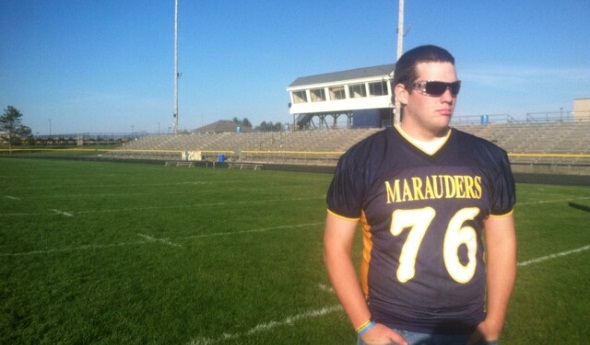 So logically, in eighth grade, he gave football a try. Two years later, at 6-foot-3 and 265 pounds, Fowler was a starting offensive tackle on the varsity.
So logically, in eighth grade, he gave football a try. Two years later, at 6-foot-3 and 265 pounds, Fowler was a starting offensive tackle on the varsity.
The Marauders’ Oct. 9 practice was dedicated to defense. Fowler took a shot to the ankle and rolled it, and remembers mentioning it to quarterback Jake Helms. That was probably about 25 minutes before the team began its daily conditioning, a set of 20 short sprints run at half to three-quarters speed.
Dave watched his son run while waiting for Morgan’s race to begin. Her mom Amy was at the starting line, and their grandparents also were in attendance, part of a larger crowd because the cross country jamboree included multiple teams from all eight schools in Ovid-Elsie’s league.
And then shock. “I knew what was going on,” Dave said. “But it was denial that I was really seeing what I was seeing.”
Call to quick action
Suddenly, Chris was face down on the ground.
Only moments later, Long and assistant Brad Sutliff were flipping him over. Long, a physical education teacher at the school, began the chest compressions. Another coach blew breaths into Fowler’s lungs.
Dave, perhaps acting on instinct as much as anything, yelled for anyone to find his wife. He took off toward Latz, who also had made her way to the cross country finish area, yelling for her to get the AED.
Word of Fowler's dire situation quickly made its way through the crowd. The Bullock Creek cross country team, surely among many others, began to pray. And Dave will never forget watching Chris’ teammates, standing a short way off, yell at him, “Don’t give up! Keep fighting!”
Latz, in the school’s Mule utility vehicle, raced to the trainer’s room, grabbed the AED and raced back. A parent from another school who is a nurse asked if she could help and took the AED to the coaches, who connected it to Fowler.
The AED gives the user explicit instructions on how to operate it, including where to attach connections and when to step away as to avoid also receiving a shock.
Sutliff was holding Fowler’s head and didn't want to set it down. But he had to – the shock was so strong it lifted Fowler’s body off the ground.
The jolt also reset his heart.
The next thing Fowler remembers, he was in the ambulance on the way to Sparrow Hospital in Lansing, vomiting. And he couldn't see. He flashed his hand in front of his face, trying to find it. It was then that he found out his heart had stopped.
After a night at Sparrow, Fowler was taken to the University of Michigan’s C.S. Mott Hospital, where he spent five days. Fowler went through the battery of tests. No problems were found. The family doesn't have a history of heart trouble. Doctors said there were no blockages.
“They said basically that it’s a miracle. There are no side effects, none whatsoever,” Dave Fowler said. “No heart damage, no organ damage. The neurologist said his brain function is perfect; there’s nothing wrong with it. And they all say that stems from the quick reaction from the coaches. … The doctor said he’s never seen chest compressions done that well.”
Ovid-Elsie has a disaster plan in place for situations like these, but had never had to put it into play for a life-threatening situation as long as Latz has been part of the athletic staff – dating back to her first year coaching in 1989.
It went off without a hitch. The whole process of starting compressions, retrieving and hooking up the AED and restarting Fowler’s heart took maybe a bit more than five minutes.
“The coaching staff is amazing, how smooth and calm everybody kept just to do their jobs. I’m just amazed,” Latz added. “I shouldn't say ‘amazed.’ Because I trust that they are very good. I’m just proud of the way they handled everything.”
She added that Ovid-Elsie’s National Honors Society has asked about raising funds to purchase an AED for a school that doesn't have one.
Many thanks to give
Fowler wears two bracelets he received while at U-M. One reads “Hearts working together,” and the other “And the beat goes on.” He was considering becoming a neurologist some day, but now cardiology seems pretty cool.
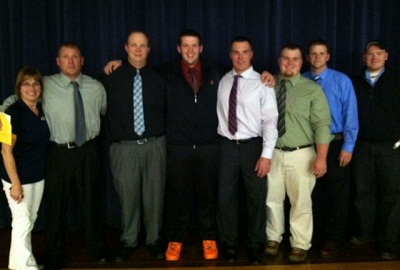 Fowler’s friends don’t ask much about that day. They know he’s trying to block it out of his memory. But others do ask the “ridiculous questions. Like, you know, what did it feel like to be dead?”
Fowler’s friends don’t ask much about that day. They know he’s trying to block it out of his memory. But others do ask the “ridiculous questions. Like, you know, what did it feel like to be dead?”
His response: “I just say I wasn't getting oxygen to my brain, so I don’t remember anything.”
The questions don’t make him angry. It’s easy to figure out quickly that Fowler is the type to let such things just roll off.
When Fowler does hear his story re-told, he feels like it’s about someone else.
But he’s a smart guy, and he’s heard enough doctor talk to understand what’s going on.
The biggest bummer is he can’t play basketball. His career in contact spots is over. That leaves golf, and he might take it up eventually. This winter, he’s going to be on the bench with his varsity teammates and he’ll help with the freshmen team and perhaps Morgan’s eighth-grade team too.
He still sounds like a football player. “It’s a lame scar,” he said of the small cut under the front of his left shoulder. Embedded in a “pocket” under his skin on the left side of his chest is an implantable cardioverter defibrillator – or ICD – meant to automatically shock his heart back into rhythm if it falls out of beat again.
Fowler came back for a football practice before the Marauders season ended, and also for the parents’ night game. He’ll still be part of that program next year too. “The joke around town is I’ll be the offensive coordinator,” Fowler said.
Dave still asks himself the what-ifs of that day. He looks at his family differently. Too many times during the day he pictures those chest compressions. It’s hard for him to leave home, and he doesn't sleep well. And he’s pretty sure Chris is getting tired of his parents peeking into his room at night to make sure all is well.
Perhaps. But Fowler also has never been one to take anything for granted – although that’s another part of what makes this situation tough. He’s always one to show gratitude, but he can’t remember right now all the people he’d like to thank. He’s just doing his best.
“I can’t remember. There are so many people. I saw some people at the football game, and I just walked up and said thank you,” Fowler said. “Because they were there, praying for me or whatever.
“I’m very fortunate. It’s unbelievable.”
Click to see more from the Wes Leonard Heart Team or the Kimberly Anne Gillary Foundation.
NOTE: Chris Fowler's parents Dave and Amy would like to give special thanks to those pictured with their son (in suit and orange shoes) above: athletic director Soni Latz and football coaches Brad Sutliff, Eric Jones, Jeremy Palus, Cody Staley, Travis Long and Dustin Thiel.
PHOTOS: (Top) Chris Fowler stands in the place on Ovid-Elsie's practice field where coaches worked to restart his heart on Oct. 9. (Middle) Fowler, in his game jersey, stands on Ovid-Elsie's football field. (Bottom two photos courtesy of the Fowler family.)
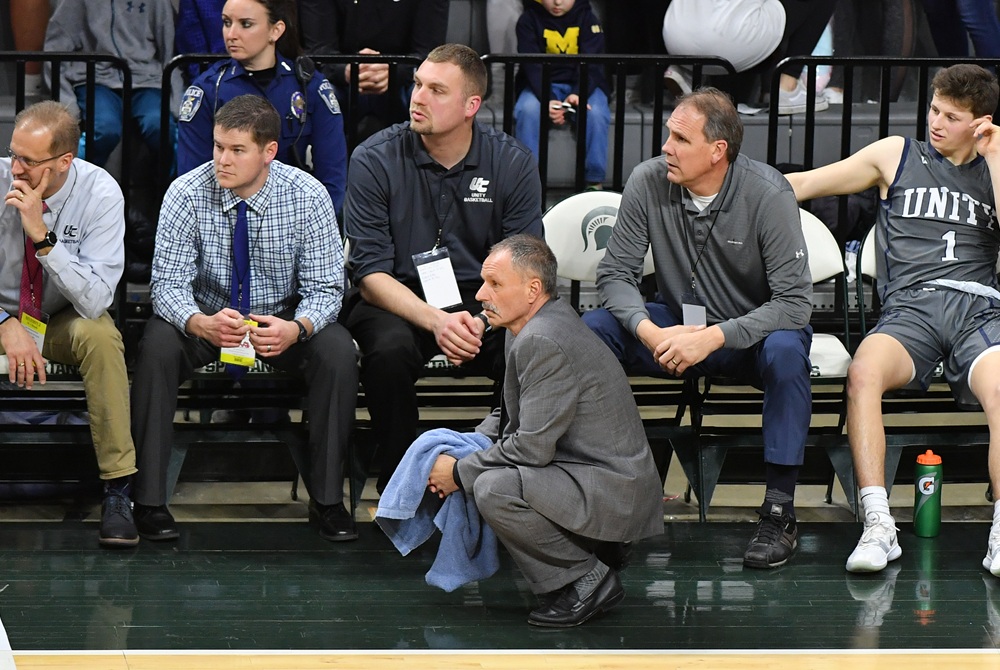
Soodsma Reaches 700 Boys Hoops Coaching Wins as Unity Launches Another Title Pursuit
By
Dean Holzwarth
Special for MHSAA.com
February 26, 2026
HUDSONVILLE – Hudsonville Unity Christian boys basketball coach Scott Soodsma has been a fixture on the sidelines for more than 40 years.
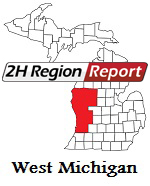 And while he’s known as a man of faith, a fierce competitor and a coach who pours everything he has into his players, he’s most commonly known as the coach with the blue towel.
And while he’s known as a man of faith, a fierce competitor and a coach who pours everything he has into his players, he’s most commonly known as the coach with the blue towel.
“I’ve had the same blue towel for 34 years at Unity, and it’s had holes in it and been sewed up a few times,” the 66-year-old Soodsma said. “It’s been around for a long time.”
The blue towel has been with Soodsma at every game, except for the first game this season against Grandville Calvin Christian.
“I had no idea where it was,” said Soodsma, who retired from teaching last year. “I stuck it in an old diaper bag and thought I would remember that I put it in there, but I didn’t. Luckily, my wife found it. I’ve never not had it except for that first game this year.”
The comfort of having a towel with him during games started during his first season (1983-84) at James Valley Christian, located in Huron, South Dakota.
It has been a lasting presence ever since, although the colors have changed.
“I had a pink towel when I coached girls at Unity, a yellow one at James Valley, and a maroon towel at McBain Northern Michigan Christian,” he said. “I don’t know, it’s just something I started having with me and I’ve had my wife run home from games when I've already been there and forgot it.
“I've sent her back home to get it because I didn’t want to coach without it. It’s been the thing I've been known for, for a long time.”
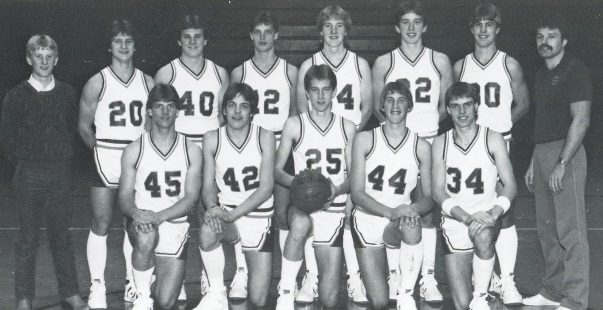 Soodsma had it with him when he earned his 700th career win as a boys coach in a 69-28 victory over Zeeland West on Feb. 12.
Soodsma had it with him when he earned his 700th career win as a boys coach in a 69-28 victory over Zeeland West on Feb. 12.
He currently is fifth on the list of winningest coaches in MHSAA boys basketball history with a 688-258 record coaching at Northern Michigan Christian and Unity.
“It’s really amazing, and I've been very blessed to be able to go the length I have gone,” Soodsma said. “There were times when I thought I was done and I was dumb enough to do girls for five years at the same time and I did one season when the girls and boys were together.
“I’ve had a lot of texts and calls from kids after the 700 wins went out in the public and those are things that make it all worthwhile, to hear the comments and the thank-yous for what you did and the part you played in their life. More valuable than that, wanting to be part of their journey and their faith as well has been a big deciding factor in why I've stayed in it.”
Soodsma, who has won over 800 games combined as a boys and girls coach, led McBain Northern Michigan Christian to the Class D boys title in 1987. He won the Division 2 championship at Unity in 2019.
He also coached Unity’s girls to the Class B crown in 2006.
“I still love it,” he said. “I love the kids and I love the competition, but over the years, most people don't realize it, but I have mellowed a lot and I think I’m in it for the right reasons because I enjoy the kids. I want to be a factor in their life, not only from a basketball perspective, but from a Christian perspective and a faith perspective. It means a lot more to me now at my age than when I was 35-40. It’s not about wins and losses anymore.”
Unity Christian senior Kyler Berguis said Soodsma has had a profound impact on his life.
In my three years of having him as my coach I’ve never had someone motivate me more to accomplish a goal we both love so much, and that is winning,” he said. “He’s an amazing motivator, always pushing kids to be their very best every single time he steps on the court, whether that is in practice, games or shootarounds, it doesn't matter.
“You will never not feel the energy that Coach brings to the court, and the crazy thing is he’s been doing it forever. He not only has pushed me in basketball but most importantly he pushes the players off the court in how to be a man of God.”
Past Crusaders standout Gabe Newhof, currently a senior at Division I James Madison in Virginia, said Soodsma’s compassion for his players runs deep.
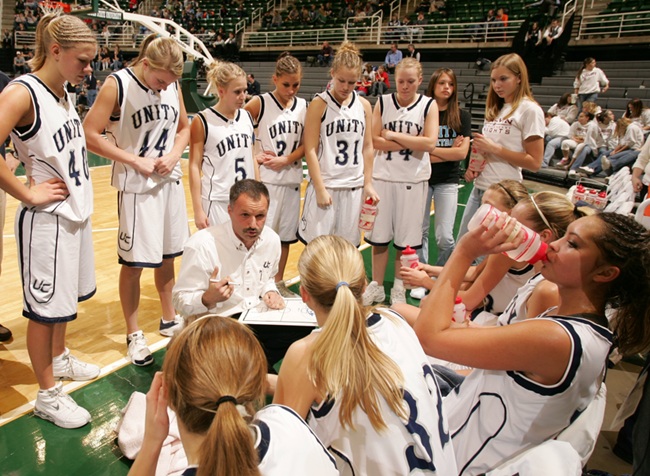 “Coach has had an incredible impact on my development as a young man,” Newhof said. “Through the mountains and valleys of my life, he has been there for me. When I suffered an awful broken leg, he came and visited me at my house to let me know he cared.
“Coach has had an incredible impact on my development as a young man,” Newhof said. “Through the mountains and valleys of my life, he has been there for me. When I suffered an awful broken leg, he came and visited me at my house to let me know he cared.
“During my successes in college he has always been a voice of encouragement. I am so glad to have had a coach like him who truly cares about me on a much deeper level than just a player.”
Soodsma has guided this year’s squad to an Ottawa-Kent Conference Black title, which included going a perfect 12-0 in league play, and a 20-3 overall record after Wednesday night’s Division 2 District Semifinal win over host Wyoming Godwin Heights.
The Crusaders’ losses were to state-ranked Rockford, Hudsonville and Freeland. Unity hopes for a deep postseason run but has been hampered recently by sickness and without a couple of its top players.
“This has been a special group,” said Soodsma, who boasts seven seniors. “The one thing we pride ourselves on at Unity is getting better as the year progresses, and I could really see the kids stepping up.
“We knew we had some good kids coming back, but I didn’t think we were playing exceptionally well in December or early January. But in the middle of the month, I started to see some kids really take some huge strides in a lot of ways. The kids have done a great job of coming together as a team, and it’s definitely shown. We’ve been playing some of the best ball we have all year.”
Soodsma has been asked frequently over the past few years when he is going to step away from coaching and retire.
He said he takes each season one at a time, but as he gets older he doesn’t want to miss out on moments with his grandkids, who are scattered through the country.
“I evaluate after every year, and I will evaluate again after this season, but this could be it,” Soodsma said. “I always like to wait till the end of the season before I make any rash decisions.
“I have family all over the United States in Seattle, Denver and South Dakota, so I really want to spend some quality time with my grandkids before they get too old."
 Dean Holzwarth has covered primarily high school sports for Grand Rapids-based WOOD-TV for five years after serving at the Grand Rapids Press and MLive for 16 years along with shorter stints at the Ionia Sentinel and WZZM. Contact him at [email protected] with story ideas for Allegan, Kent and Ottawa counties.
Dean Holzwarth has covered primarily high school sports for Grand Rapids-based WOOD-TV for five years after serving at the Grand Rapids Press and MLive for 16 years along with shorter stints at the Ionia Sentinel and WZZM. Contact him at [email protected] with story ideas for Allegan, Kent and Ottawa counties.
PHOTOS (Top) Unity Christian boys basketball coach Scott Soodsma, kneeling, confers with his staff during his team’s 2019 Division 2 Boys Semifinal win over Ludington. (Middle) Soodsma, far right, stands for a photo with his 1987 Northern Michigan Christian Class D boys basketball champion. (Below) Soodsma maps out strategy during a break in the 2006 Division 2 Girls Basketball Final. (MHSAA file photos.)

